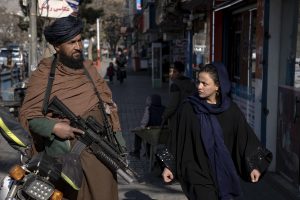Perhaps the most striking feature of the Taliban regime is the ever-growing list of restrictions it has imposed on Afghanistan, arguably making the administration synonymous with bans. While reports continually highlight the practices being outlawed in the country, along with the harsh punishments for violating the restrictions, the question remains: What causes the Taliban to institute all these bans in the first place?
Research into the Taliban’s ideological roots uncovers their preoccupation with social control, ranging from bizarre restrictions on innocuous recreational activities to draconian bans on the exercise of women’s fundamental rights.
It is usually misunderstood that the Taliban’s heavy focus on bans and penalties is inspired by Saudi Wahhabism. After all, the Wahhabists provided funding to the Deobandi madrasas that produced the Taliban, and had an easy-to-emulate social control system guided by clergy and executed by the religious police. It is also thought that the tribal code of Pashtunwali makes the Taliban hate women and girls to the extent that the militants deprive them of fundamental rights, given the undeniable misogyny of the Pashtun rural culture.
However, taking a deep dive into the history of India’s Deoband seminary – whose ideology is foundational to the Taliban – reveals a different story. In fact, the Taliban cannot be understood without considering the earliest history, beliefs, and practices of Deobandism. Few people know the background of this movement before the establishment of Darul Uloom Deoband. Significantly, the two founders of this seminary – the ideological forefathers of the Taliban – were themselves heirs of the Islamist philosophy whose most prominent theoretician was Shah Waliullah Dehlawi of the late Mughal era.
Having been exposed to the medieval cleric Ibn Taymiyyah’s controversial understanding of Islam that still echoes in the discourse of terrorist groups, Dehlawi emphasized only the study of the original Islamic sources, deemphasizing rational sciences. He deemed it necessary to “purify” Islam of all “alien” influences that in his view were responsible for Indian Muslims’ religious decline, leading to their political decadence. He argued that for Muslims to strongly rule India, they must practice Islam, according to his Ibn Taymiyyah-inspired understanding of how it was observed in the Prophetic era, under the leadership of mullahs. Dehlawi’s group influenced Mamluk Ali and Imdadullah Makki, who became the mentors to Qasim Nanautavi and Rashid Gangohi. Makki, Nanautavi, and Gangohi in the British Raj formed a Taliban-style mini-state in the north of Delhi for launching rebellious jihadist activities, before this nascent Islamist emirate was crushed by the British.
It was here that Nanautavi realized the only way to confront the British was to do so educationally. Adopting their educational model, he established a madrasa in the town of Deoband that would produce male clerics who not only lead a religious revival but also provide political leadership. Along with Gangohi, he made this seminary the center of a nationwide madrasa network. This 19th-century school, “Darul Uloom Deoband,” became the parent institution for all the Deobandi madrasas in Afghanistan-Pakistan where the present-day Taliban studied. For instance, Pakistan’s Haqqania madrassa, which produced the top Taliban leadership, is not just inspired by but established by an alumnus of Deoband.
A mini-cosmos in itself, Darul Uloom Deoband remains the locus of an austere, puritanical, and medieval brand of Islam, marked by the absence of females and the austere appearances of males. Typical youthful hobbies – like flying kites, watching movies, and listening even to devotional music – are non-existent. These things have been banned by the Taliban, too. Instead, everything appears purged of the “influences of the other,” based on the problematic binary worldview of “Muslims versus kuffar (infidels).”
This “purifying” focus is evident from Deoband’s curriculum as well as its Darul Ifta (house of legal opinion) webpages, wherein fatawa (clerical decrees) are quoted in response to questions. In these retrogressive fatawa, matters ranging from women’s equal human rights to men’s use of neckties are called “unlawful,” or the “way of non-Muslims,” similar to the Taliban’s ban rhetoric. Additionally, Darul Uloom’s principal supports the Taliban regime’s segregation policy since women’s veiled contact with men prevents “fitnah” (temptation), creating an idealized Islamist society.
Given the history and current reality of the Taliban’s spiritual home in Deoband, it is not surprising why this cleric-led movement is so hardline when it comes to social policy. The Taliban’s higher education minister termed female education a “recipe for debauchery and obscenity from foreign lands.” The Deoband-inspired Taliban condemn and ban all activities they view as “contaminating practices,” those inspired by sources other than their fossilized understanding of Islam, enforcing harsh punishments upon violators through religious police.
Contrary to what is assumed, the Taliban, thus, are not some aberration from the Deoband tradition of ensuring social control, rather as political Islam scholar Kamran Bokhari explains, they are the “realization of the 15[7]-year-old Deobandi movement’s objective of establishing a regime led by Sunni clergy.”

































